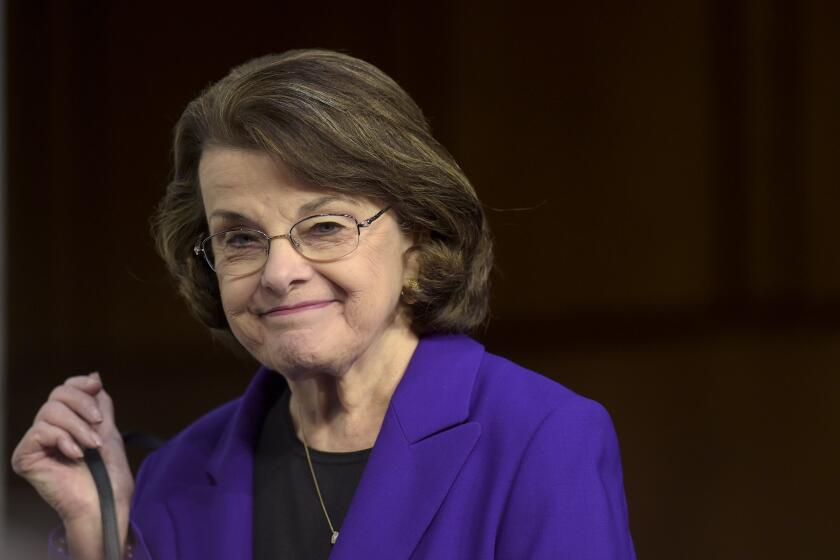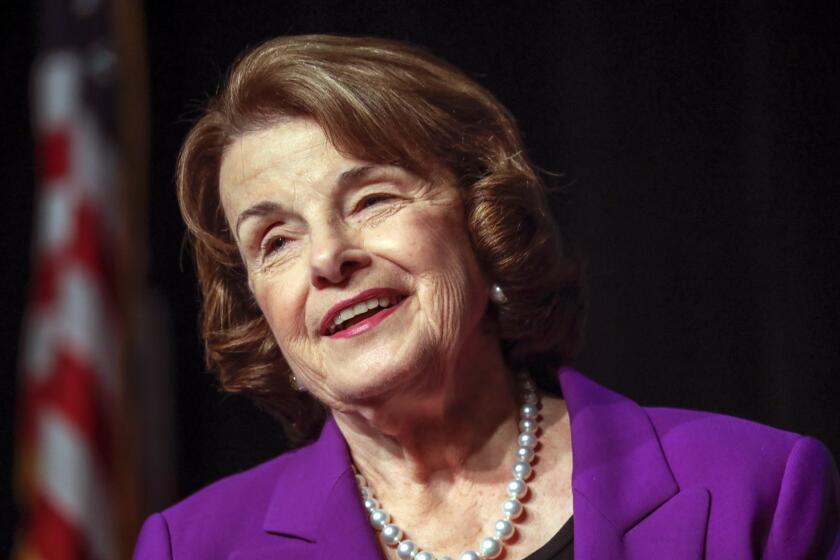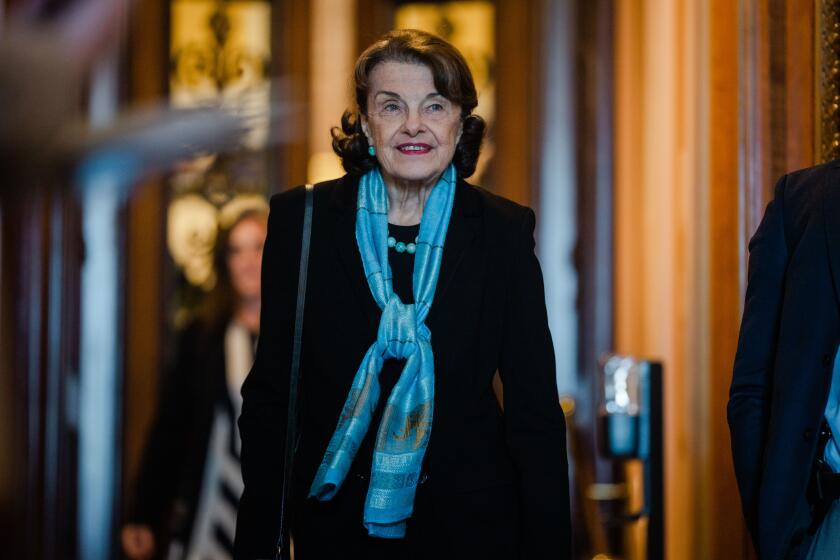‘I always think of her as mayor’: Dianne Feinstein’s legacy lives deepest in San Francisco
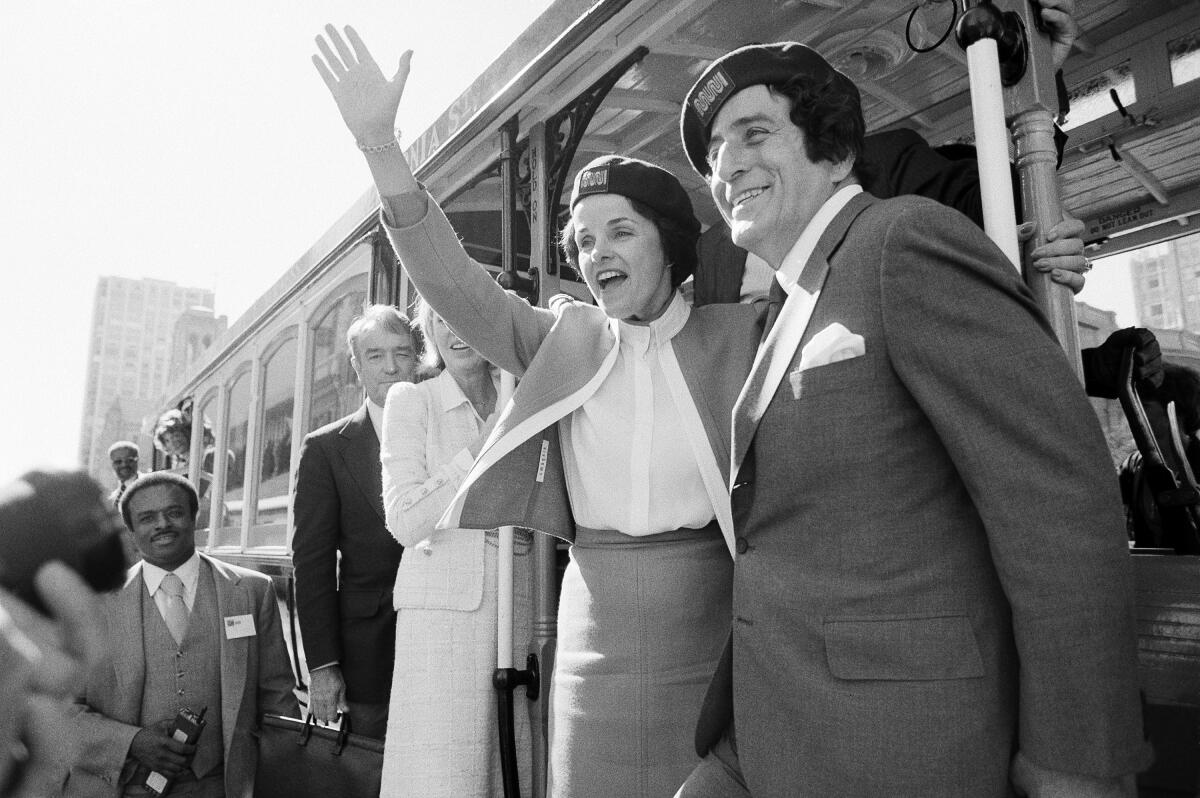
- Share via
SAN FRANCISCO — Hours after Sen. Dianne Feinstein died Friday at age 90, Tania Chacón walked up to a pair of ornate tables set up in San Francisco City Hall for mourners to write their goodbyes.
A city native who works in the building for the Assessment Appeals Board, Chacón said she had cried at the news that morning. Now, she was the first member of the public to sign the city’s “condolence book” for Feinstein, who served on the local Board of Supervisors and for a decade as mayor before starting her long Senate career.
Chacón, a 48-year-old Latina raised by an immigrant family in the Mission District, was full of memories of Feinstein in the city, she said — of meeting her as a kid and marveling at her ability to cut a path for herself as a woman in politics. The late senator, herself raised in a well-heeled Jewish family from a posher part of town, just had a knack for showing she cared about her fellow San Franciscans, no matter their background, Chacón said.
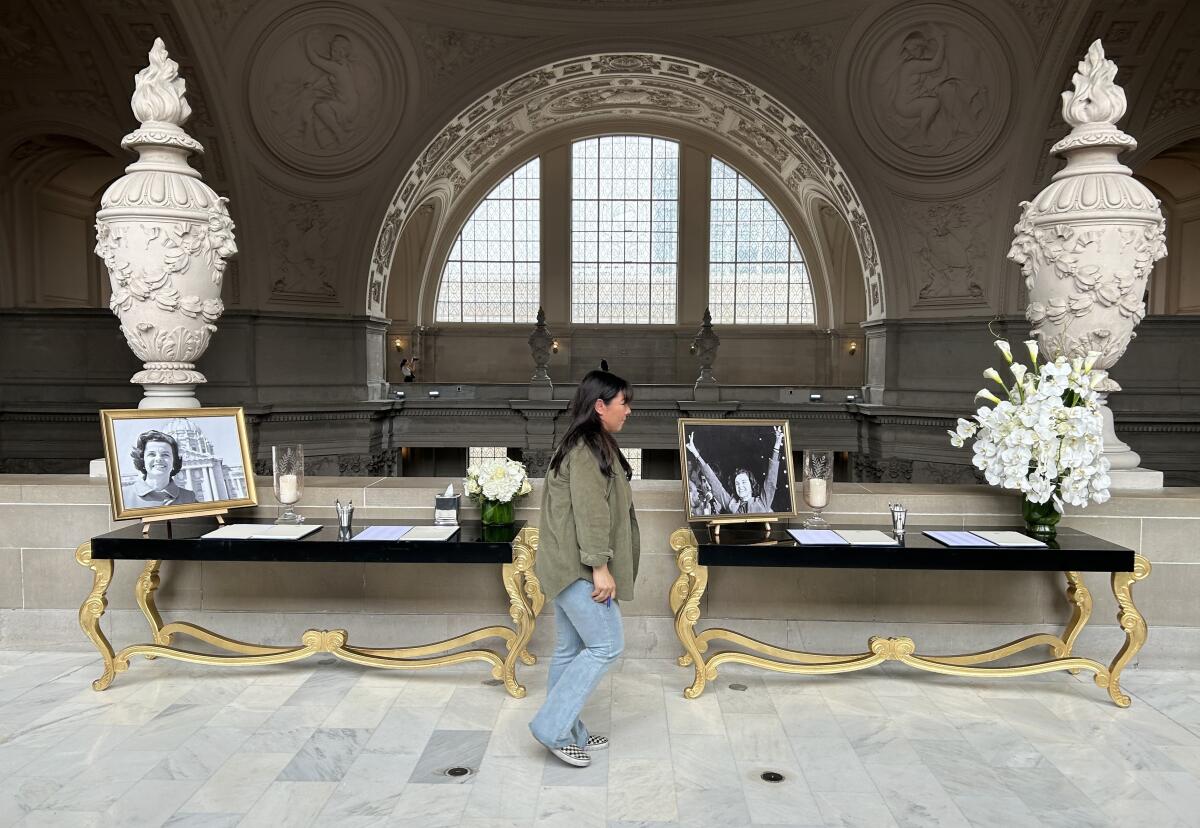
“I always think of her as mayor, still,” she said. “I have just these fond memories of her always staying true to San Francisco in her heart.”
After a three-decade career as the first woman to represent California in the U.S. Senate, Feinstein was the rare politician to transcend local prominence and carve out a truly national profile in Washington. She helped shape federal policy in the nation’s highest halls of power and commanded respect there before women were routinely afforded it.
Since her death, those national bona fides have been cited in remembrances coast to coast. But in Feinstein’s hometown, San Franciscans like Chacón were reflecting just as much on her local influence as they were her time in Washington.
City residents remembered Feinstein not as a far-flung power broker, but for her efforts to attend their local events, fill potholes, save public transportation routes, respond to letters they wrote her and speak out against bigotry and injustice in their neighborhoods. Some also remembered her in a less positive — but no less local — light, including for her frosty relationship with San Francisco labor groups.
Sen. Dianne Feinstein survived an assassination attempt and a mayoral recall to become the most popular politician in California for years running.
Gia Danieller-Katz, co-chair of the Raoul Wallenberg Jewish Democratic Club, said Feinstein’s death brought to mind a big fight in the late 1970s, when a Nazi bookstore opened in the Sunset District.
The store’s opening sparked violent clashes between neo-Nazis and Jews and led to the desecration of a local synagogue. Afterward, community members organized and built a Holocaust education center and monument to Nazi victims, Danieller-Katz said, and Feinstein — then mayor — showed up to speak movingly at the dedication.
It was the sort of commitment she would continue to show long after she’d left her post in city government and moved on to the Senate, Danieller-Katz said.
“Some people who leave and go on to national office, you don’t get a sense they’re still active in their local community. But with Feinstein you did,” she said. “This was her city, so she paid attention, and she still got in there trying to push things one way or another.”
‘You need to fix that!’
Even at the height of her career in Washington, Feinstein kept one eye on the state of San Francisco — to the amusement and exasperation of her successors at City Hall, whom she would call about potholes, broken curb cuts and any number of other small complaints and problems.
One staffer to former Mayor Ed Lee, who would speak to The Times only on condition of anonymity so soon after Feinstein’s death, said Lee’s office used to keep track of her travel schedule from Washington to San Francisco International Airport.
Lee’s team “knew her route from SFO to [her] house,” the staffer said, and paid particular attention to having that path through the city extra clean.
Peter Ragone, who served as then-Mayor Gavin Newsom’s press secretary, said every mayor who succeeded Feinstein grew accustomed to such calls — which came regularly and especially after she’d been driving around the city.
“ ‘Gavin, I was driving Larkin Street and I saw some trash,’ ” Ragone recalled her saying during one such conversation. “ ‘You need to fix that!’ ”
To Ragone and others, Feinstein’s ongoing interest in the minutiae of city governance was a measure of how much she cared about her hometown and its residents.
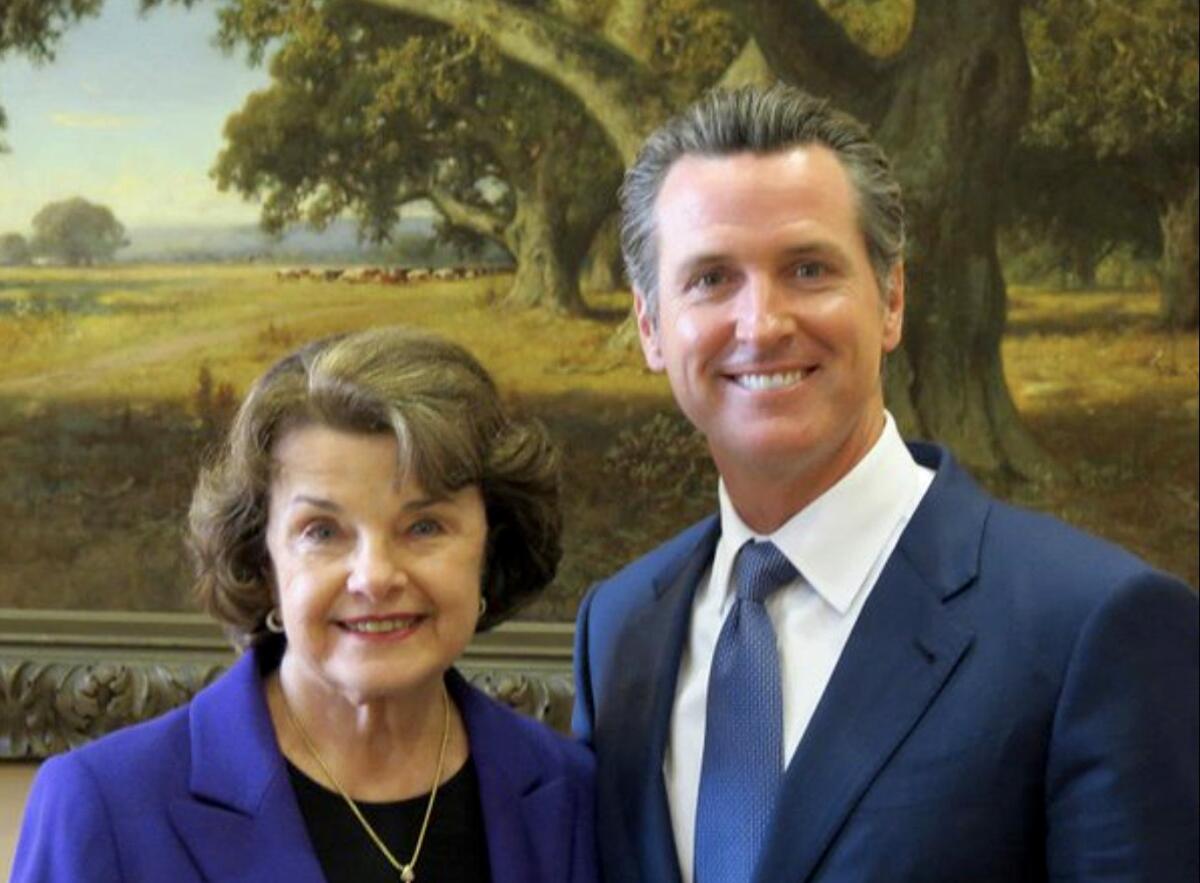
Others felt that care in other ways, too.
On Friday afternoon, friends David Clarke, 75, Charles O’Rourke, 76, and Gilbert Engelman, 87, sat sharing drinks at the Castro neighborhood’s long-standing gay bar Twin Peaks Tavern.
Engelman, who has lived in San Francisco since 1970, recalled Feinstein courting support in the gay community nearly half a century ago, often with her young daughter Katherine in tow.
“She’d walk around trying to get people to vote for her. I liked her,” he said.
“She got things done,” said O’Rourke, a San Francisco native who praised Feinstein for helping save the city’s streetcars. “If they had gotten rid of them, I’d have been furious.”
Feinstein ruffled feathers in the gay community in the 1980s when she closed the city’s bathhouses amid the spread of AIDS. O’Rourke said he agreed with the decision; Engelman said he disagreed. But both men said they understood, and never doubted that Feinstein cared about what was happening to the gay community — which couldn’t be said for all politicians back then.
Political leaders in Washington and across the country recalled Sen. Dianne Feinstein as a trailblazer and an early voice for gun control.
Today, the men said, they think of Feinstein as one of many important allies in the gay rights movement whom San Francisco can call its own.
“She did as good for a straight woman as she could do,” Engelman said with a smile.
Mawuli Tugbenyoh, co-chair of the Alice B. Toklas Democratic Club, said Feinstein “is synonymous with San Francisco” and also remembered her as an LGBTQ+ ally.
“We definitely appreciate the fights that she fought,” the 41-year-old Tugbenyoh said. “We need allies, and she was one of the earliest allies and advocates we had. We wouldn’t be where we are today without her.”
A local presence
Feinstein, a San Francisco native who was born in 1933, graduated from Stanford University in 1955. By the time she won her first political race — for a seat on the Board of Supervisors in 1969 — she had married twice and had daughter Katherine.
She emerged onto the national stage when, in 1978, she was elevated from board president to mayor when then-Mayor George Moscone and Supervisor Harvey Milk were assassinated at City Hall.
In 1980, Feinstein married her third husband, Richard Blum — an investor with an equity management firm who died last year. Feinstein was mayor until 1988, ran unsuccessfully for California governor in 1990 and won her Senate seat, which she never gave up, in 1992. She and Blum lived a wealthy and well-appointed lifestyle, traveling between their homes — including in San Francisco and Washington — on a private jet.
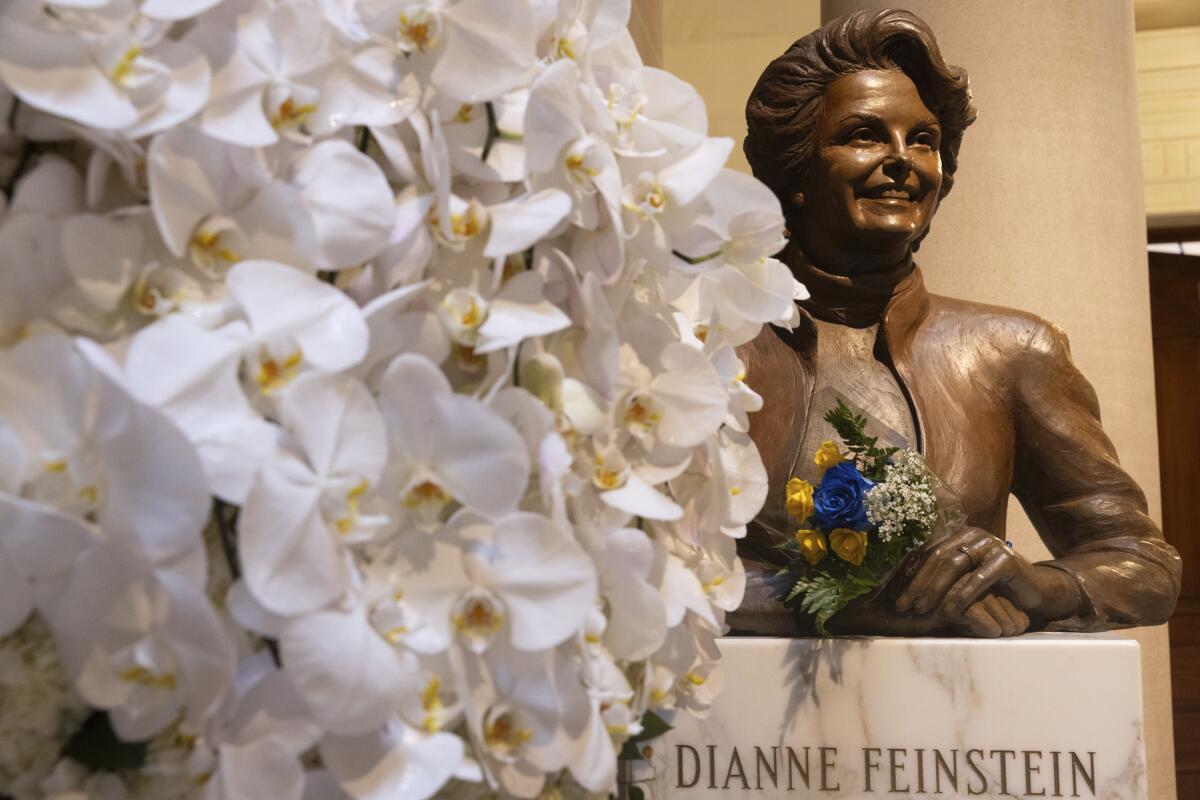
Although Feinstein was often away from San Francisco, her presence never fully faded.
Rabbi Jonathan Singer of Congregation Emanu-El, said he knew Feinstein — whom he called a “proud member” of the congregation — for decades.
Feinstein often spent the autumn high holidays in the gold-domed, Byzantine Revival synagogue — one of the oldest in California and among the largest in the U.S. — usually sitting three rows back from the front, Singer said.
“It was always so moving for us to see this amazing, courageous leader in our congregation,” Singer said. “She was always generous and warm with her connection to people.”
The rabbi said he liked to believe that some of Feinstein’s “clear-eyedness when it came to being able to stand up to injustice came from her background in the values of Jewish life.”
Sen. Feinstein comes by her extraordinary political legacy not because of any single legislative achievement but because she was recognizably solid, powerful and strong.
At Dianne Feinstein Elementary School in the city’s Sunset District — renamed for the senator in 2006 — Principal Salwa Zaki said flags were lowered to half-staff Friday as teachers held a moment of silence and shared memories of the lawmaker during a school-wide “community circle.”
Over the years, Feinstein had not only lent her name to the school but also provided “generous donations to support the library, technology, social-emotional learning and much more,” Zaki said. “During her school visits, she especially loved reading to students.”
Others felt Feinstein’s lingering presence in other ways.
Nato Green, a comedian and collective bargaining coordinator at SEIU Local 1021 who grew up in San Francisco, said he remembers Feinstein for her key role in decimating the city’s once-powerful restaurant union and her frosty relationship with workers.
In 2009, he said, union officials took what he estimated to be 1,000 nurses to picket outside of Feinstein’s mansion on the famous Lyon Street Steps on the Presidio.
“It was this incredible visual of nurses in red pouring down the steps, but no one was home and she didn’t care,” he said.
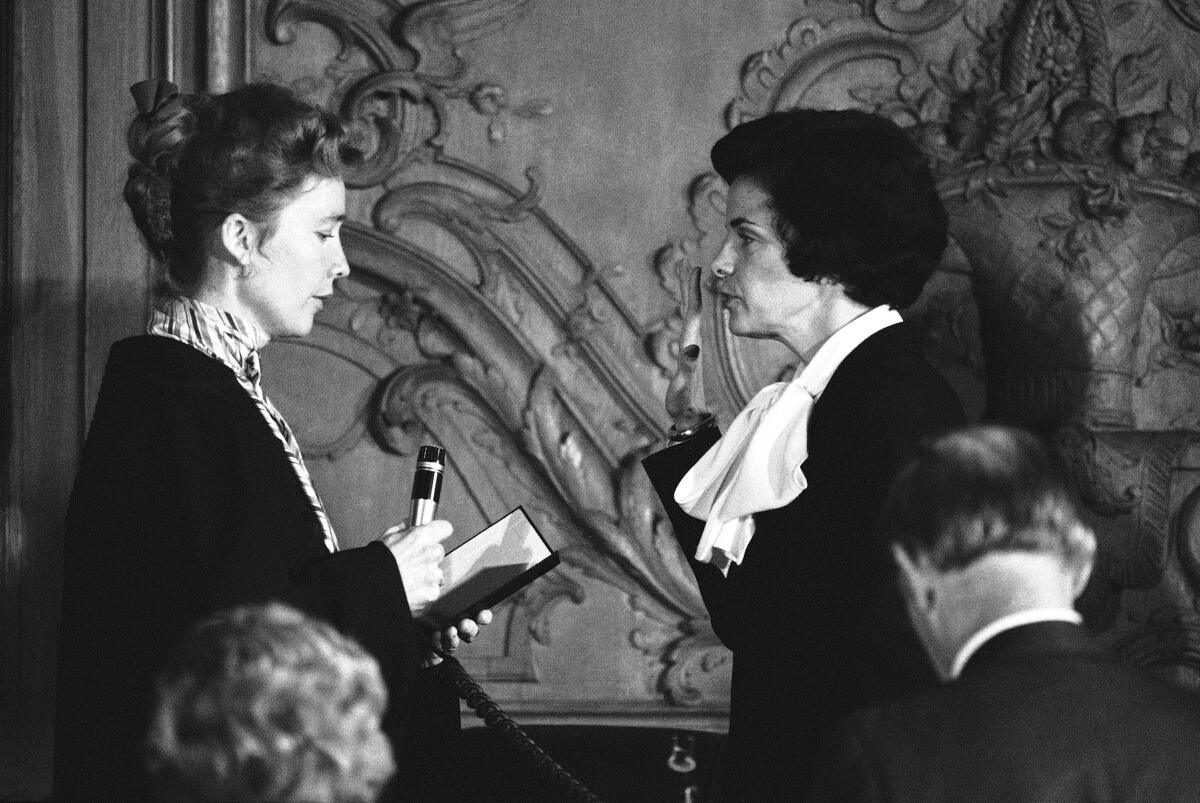
To Green and others, the late senator was emblematic of a certain kind of San Francisco politics: liberal by any national standard but conservative on matters of “land use, law and order and what level of cruelty should be inflicted on the unhoused,” Green said.
“Feinstein represented San Francisco’s version of our home-grown local liberal aristocracy,” he said, who “care about civility more than they care about accomplishing anything.”
During Feinstein’s tenure as a politician, San Francisco’s reputation has weathered ups and downs — spotlighted as a gem of urban culture and castigated as a liberal wasteland of crime, homelessness and debauchery.
Feinstein, always prim and proper, at times seemed an odd icon of the leftist city. She fought for gay rights and gun control, but she broke ranks with the left wing of the Democratic Party on a regular basis and took some political positions that rankled her progressive constituency.
Toward the end of her life, calls for her to give up her seat were as much rooted in the notion that she no longer represented the values of liberal California as they were in concerns about her advancing frailty and — particularly during illness in the last year — her inability to be in Washington for crucial votes.
Feinstein never bowed to that pressure, but she also never gave up on San Francisco.
At a news conference at City Hall on Friday morning, Mayor London Breed said with a smile that she, too, had been on the receiving end of calls from Feinstein — which were “always about the city, always about what I needed to do, in a very loving way.”.
She said Feinstein “still believed in San Francisco as an extraordinary place,” despite “unfair, unjust” criticism of the city on the national stage.
“She really is a part of the fabric of San Francisco, so what went through my head is how important it is that we do justice to her legacy, how important it is that we show respect to the people who love her so much,” Breed said.
Saying goodbye
Dianna Vandeveer, 65, of San Francisco showed up to sign the condolence book for Feinstein wearing multiple Feinstein campaign pins from the 1990s on her T-shirt and a “F— Trump” pin on her hat.
Originally from the Central Valley, Vandeveer said she is a longtime member of the League of Women Voters who worked in a can-making factory in jobs once reserved for men, but which women leaders like Feinstein helped open up for her.
Feinstein could have lived a privileged, easy life, but she had “moxie” and instead chose to work in politics to advocate for women who were “nowhere near her tax bracket” and needed the help, said Vandeveer — who remembers Feinstein showing up to League protests pushing a baby carriage.
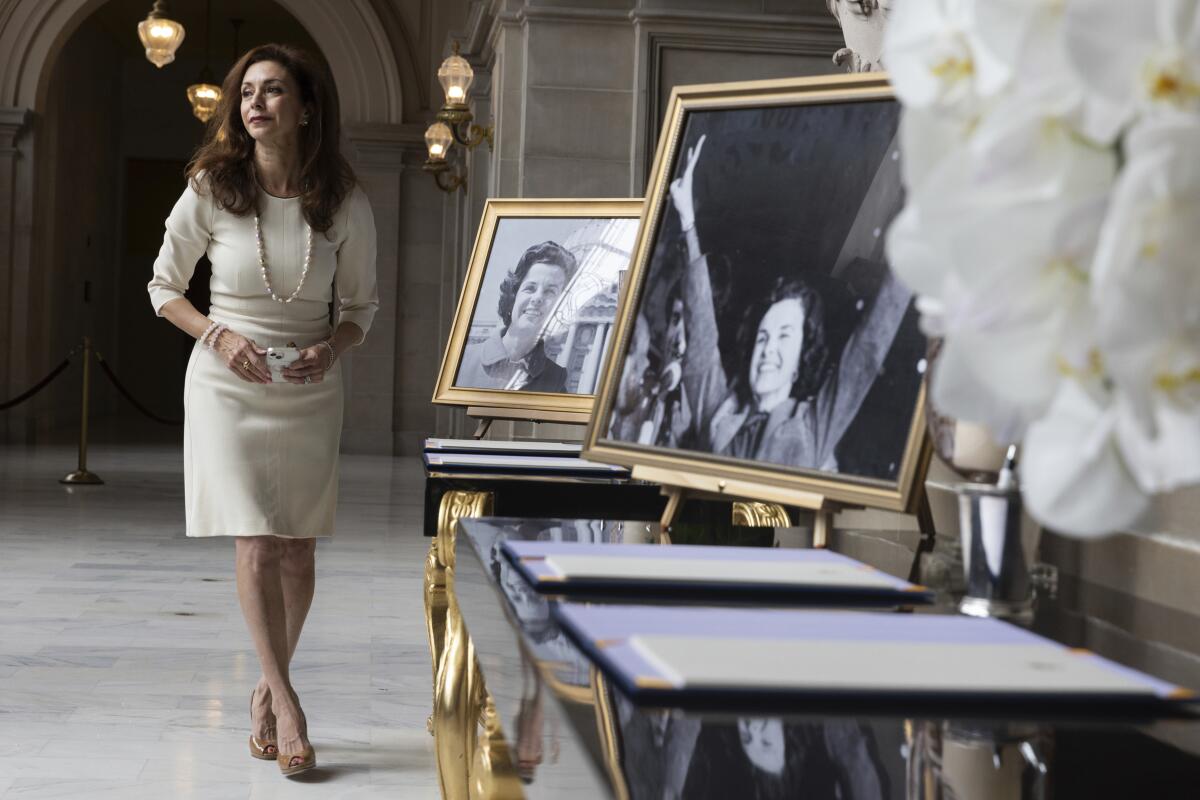
“She was prim and proper, and you knew she was going to go somewhere — and she asked us all what was important for females then, and she tried her best and did those things that mattered to people in my stature, not only in hers, you know, coming out of Stanford and the family she’s from,” Vandeveer said. “We without child care, we without equal pay — she helped us rise up as females.”
For Chacón, Feinstein’s efforts to help women — particularly in San Francisco — are also what stuck out as she penned her final message to the late senator.
“As a little girl, I met you and you inspired me to grow to be a strong woman in my community,” she wrote. “You paved the way for us as women leaders. You will always be remembered as such for myself and my family of native San Franciscans.”
More to Read
Sign up for Essential California
The most important California stories and recommendations in your inbox every morning.
You may occasionally receive promotional content from the Los Angeles Times.
